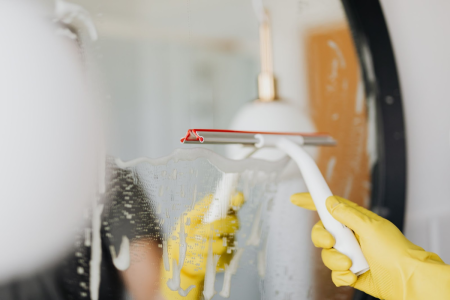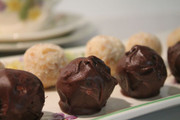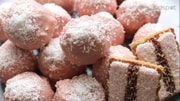These shower-cleaning items could be doing more harm than good!
There's no doubt that we all have some excellent tips and tricks under our belts. It's only natural that we've picked up invaluable cleaning tips over the years, especially when it comes to using everyday household items that seemed rather handy for keeping our home clean without breaking the bank.
However, there are some cleaning items that could actually do more harm than good when it comes to maintaining your precious shower space. So grab a cup of tea, take a seat, and let us guide you through our list of commonly used DIY items that you might want to think twice about before putting to use during your next shower-cleaning session.

Not only does bleach come with strong odours and respiratory risks, but it's also ineffective against mould, serving only as a superficial stain remover instead of killing off the organism lurking beneath your tiles.

After exploring some household cleaning hacks, including surprising revelations and helpful alternatives, it's clear that caution is key when using DIY cleaning solutions. They may not always be as beneficial as expected and can even cause harm.
With this in mind, how do you ensure your safety and maintain a positive and effective approach to cleaning your shower? Share your tips and experiences with us as we strive for safe and happy shower cleaning!
However, there are some cleaning items that could actually do more harm than good when it comes to maintaining your precious shower space. So grab a cup of tea, take a seat, and let us guide you through our list of commonly used DIY items that you might want to think twice about before putting to use during your next shower-cleaning session.

Using these shower cleaning products may have unintended negative consequences. Photo by Karolina Grabowska.
Bleach
Our first surprise is the ever-popular bleach. While there's no denying its strong cleaning properties, it has some serious drawbacks. According to HouseDigest: 'In a small, unventilated place, like your shower, the fumes from bleach can make you feel nauseous, considering how hazardous they are. The chlorine in bleach has the capability of damaging surfaces and bonding materials, like grout and silicone, over time.'Not only does bleach come with strong odours and respiratory risks, but it's also ineffective against mould, serving only as a superficial stain remover instead of killing off the organism lurking beneath your tiles.
Bicarb Soda
Let's move on to the next household favourite: Bicarb soda. Despite its impressive ability to absorb odours and battle stains, bicarb soda can be too abrasive for surfaces like glass, metal, and plastic in your shower. So while it saves the day when deodorising the fridge, it might not be the superhero you need in the bathroom after all.Oils
But wait, there's more! You might want to reconsider using oils - even natural ones like tea tree oil—on your shower floors. They may be great for removing stains and adding shine, but they can also create a dangerous, slippery film.Alternative Uses
While it may seem like we're snatching away your secret weapons, don't worry! We have some alternative uses to consider for these DIY cleaning items:- Bicarb soda: When mixed with water to create a paste, it works wonders on tile grout, scrubbing away dirt and discolouration without causing damage.
- Oils: Avoid using them on shower floors, but feel free to apply them to the shower walls, as they'll still provide excellent cleaning and disinfecting properties.
Vinegar
For those of you still searching for a mould-busting solution, look no further than the humble white vinegar. It's an excellent alternative to bleach that won't leave you gasping for breath. Just make sure to ventilate the area while using it and dry the shower thoroughly afterwards to ensure mould stays at bay.Rubbing Alcohol
And finally, for shower doors and metal fixtures, you can swap out harsh chemicals for white vinegar or rubbing alcohol diluted in water—these are not only excellent disinfectants, but they're also great for enhancing shine and clarity.Best Practices for Shower Maintenance and Cleaning
For all those who want their shine and health to remain intact, here are some fool-proof methods for a spick and span shower.Regular Cleaning
Firstly, regular cleaning is key. Ensure that you clean off any residue from soap or shampoo and body wash with every use, so that mould and grime build-up can be avoided. It may seem like a hassle after a relaxing shower, but it’ll save you heaps of time and effort in the long run.Dry Your Shower
Another key tip to remember is to quickly dry your shower after cleaning with a squeegee or cloth. Moisture can easily be trapped in grout and tile, leading to the formation of mould. Furthermore, for shower curtains, ensure that they are made of anti-bacterial material and are washed regularly. Reduce moisture levels in your bathroom by opening windows, running fans or turning on the heated towel rail, if you have one.Go Easy On Abrasive Materials
In terms of proper use of cleaning items, go easy on abrasive materials such as scourers—they may be able to scrub away dirt and grime, but they can also damage surfaces. Generally, hard brush heads can be too much for shower items, so try a soft cloth or bristle brush instead for a gentler scrub.
Key Takeaways
- Bicarb soda, bleach, and oils aren't ideal for cleaning showers due to their potential to damage surfaces or create hazardous conditions.
- Some DIY cleaners can be used on specific surfaces in the shower, such as bicarb soda for tile grout and oil-based cleaners on the walls.
- Alternative cleaners such as white vinegar, rubbing alcohol, and a mix of soap, bicarb soda, and hot water can be used for stubborn stains and cleaning shower doors and fixtures.
- Adequate ventilation is important when using these cleaning solutions to avoid strong odours and fumes.
After exploring some household cleaning hacks, including surprising revelations and helpful alternatives, it's clear that caution is key when using DIY cleaning solutions. They may not always be as beneficial as expected and can even cause harm.
With this in mind, how do you ensure your safety and maintain a positive and effective approach to cleaning your shower? Share your tips and experiences with us as we strive for safe and happy shower cleaning!







